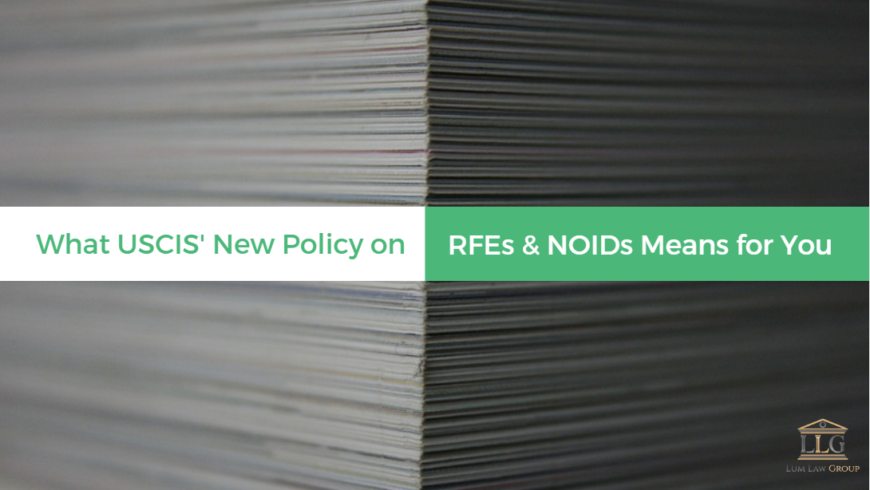What Immigration’s New Policy on Requests for Evidence and Notice of Intent to Deny Mean For You
United States Citizenship and Immigration Services (USCIS) recently published a policy update and field guide memo regarding the issuance of Requests for Evidence (RFE) and Notice of Intent to Deny (NOID). The new policy gives adjudicators (aka immigration officers) more power to make discretionary decisions as to whether an immigration application or petition meets the minimum requirements to warrant an RFE or NOID. The new policy will go into effect September 11, 2018, at which point USCIS adjudicators will have discretionary power in processing immigration cases and will not be required to request for additional evidence or inform petitioners and applicants of an upcoming denial.
What is a “Request for Evidence” (RFE)?
First, we’ll explain what USCIS means by a “Request for Evidence” (RFE) notice. Applicants and petitioners will receive RFE notices when their application or petition is missing critical information that the immigration officer needs in order to process and decide on their cases. Previously, immigration officers (or adjudicators) may issue RFE requests for any deficiency.
For example, a I-130 Petition for Alien Relative petitioner who petitions for his father may have neglected to provide his parent’s marriage certificate, but his application is otherwise fine. On the other hand, an applicant filing a I-601A Waiver may have provided all basic documents, such as birth certificates, marriage certificates, and evidence of long-term residence, but failed to provide proof of extreme hardship to his or her U.S. citizen spouse/parent.
Once this policy is in effect, we can assume that the the I-130 petitioner would still receive an RFE, but the I-601A applicant would not, but would be denied immediately.
Examples of RFE requests include, but are not limited to, providing documentary evidence, applying for a police clearance, attaining an FBI background check, or writing a declaration. RFE requests usually have a set deadline from the date of the letter.
What is a “Notice of Intent to Deny” (NOID)?
A Notice of Intent to Deny (NOID) is exactly as described; it is a letter detailing why your application or petition will soon be denied. The letter will quote relevant immigration law and describe and explain existing policies that guide the adjudicator into making the decision to deny.
The difference between the NOID and RFE is that with the NOID, the immigration has already come to a conclusion, and any response to the NOID will need to counter the points for denial, if possible. With the RFE, the immigration officer has yet to make a decision, and cannot make one before relevant evidence has been provided.
The policy does not affect NOIDs which must be issued when information not provided by the applicant or petitioner is used to deny. USCIS often cross-checks with other government departments, checking border control records, FBI records, and so forth. When it does so and discovers facts that negatively affect one’s petition or application, it will issue an NOID to explain the basis of the denial.
Why are they making this policy change?
In the policy update, USCIS states that the change is not meant to discourage people from applying on their own (rather than with the help of a professional), but is meant to discourage people who are applying with USCIS just to have something pending (“‘placeholder’ filings”).
What does this mean for us?
We have had clients hire us half-way into the process because they tried filing on their own, received an RFE, and came to us for help. When you hire a lawyer to help with paperwork, it means that we will review them for issues and ask you to get more evidence or explain discrepancies. The clients described above were reluctant to cooperate at first, and as a result our RFE response was insufficient, and they received an NOID. Once our clients realized that just hiring an attorney is not enough if additional documents, declarations, and overall evidence is not provided, then we were able to overturn the NOID and we eventually received an approval.
The purpose of the above example is to emphasize how important client cooperation is to client success. We need time to carefully examine what we have on hand, or what was previously submitted, what is being requested, and then, and only then, can we provide advice as to what more is needed. Once we receive all the evidence, we also need time to review, process, and organize the documents into a clear description that accurately describes our client’s individual situation. This new policy means that we will need to be extra diligent, extra careful, and spend extra time on each and every petition/application.
Our job is not only to review your documents and fill out forms for you. In fact, the most important part of our job is to organize your information and prepare it in such a way that the immigration adjudicator can easily and effortlessly review and understand your individual situation. The presentation of your situation is important, and we take pride in how we take extra steps to meet the silent requirements.
Do you have questions on this new policy update? Contact us today!

